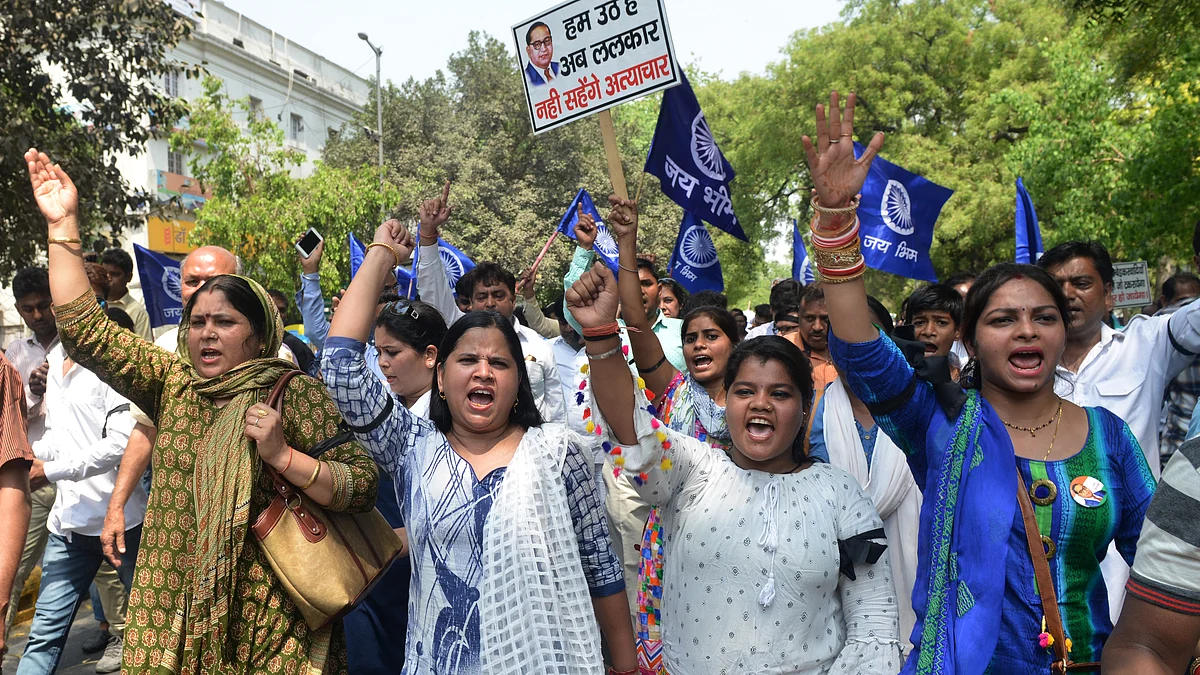Dalit youth have no use for leaders any longer
Emergence of Jignesh Mevani in Gujarat and Chandrashekhar Azad in UP as Dalit leaders reflect the predicament of conventional leaders attached to political parties

When Rohith Vemula committed suicide at the Hyderabad Central University in January 2016, both Ramdas Athawale, a union minister in the NDA government, and Bhalchandra Mungekar, former vice chancellor of Bombay University and a member of the Planning Commission under the UPA, were barred by the students from entering the campus. They were seen as stooges of the BJP and Congress respectively and the students wanted to have nothing to do with either of them.
Prahlad Jogdand, Professor of Sociology at the Bombay University was greatly heartened. He had then predicted that the worm might have turned so far as Dalit movements in the country were concerned and hoped they wold take charge of their own lives. Dalit youth had no use for such ‘leaders’ any longer, he held.
According to Dr Tushar Jagtap, a Dalit activist and social thinker, Dalit youth today have no use for leaders. “The self-serving accommodation of many of them in the past with vested interests who do not have Dalit interests at heart had already pushed these leaders to the fringes. And with no use to their community any more, they are likely to be pushed further out to the furthest periphery of society.”
According to him, most young Dalits today have acquired a decent education and are adept at the use of technology, particularly social media. “That’s all they need to communicate with each other and organise themselves to raise their concerns. You will see more such leaderless movements in the future.”
The 2016 uprising of Dalits in Una in Gujarat is illustrative of what Jagtap avows. Non-descript Dalits from across the state organised themselves into a protest march of huge proportions and Jignesh Mewani rose from almost nowhere to lead them to their goals.
Although he is now an elected representative, having been voted to the Gujarat assembly with Congress support, he does not have a political party and is not really a leader in the old fashioned mould of political parties. He is of the people, for the people. He does not have any particular interest apart from raising his voice against Dalit atrocities. He was present at Bhima Koregaon within hours of violence breaking out between Dalits and upper castes and both in Una and in Pune, he made ample use of social media to organise and encourage the people as well as cock a snook at the authorities. Like Azad he has neither power nor position but continues to torment the ruling dispensation.
But, according to Professor Ramesh Kamble, also teaching Sociology at Bombay University, Dalit leaders associated with political parties have been left with no choice but to be bit players in the larger scheme of things.
All mainstream parties co-opt these leaders to seem egalitarian and attract Dalit votes, but they are almost never given any power with their positions. The moment they assert themselves within their party or society, there is an attempt to crush their individuality and they are compelled to remain subservient to mainstream interests.
Nothing illustrated this better than how the Uttar Pradesh government has attempted to crush Dalit assertion by the Bhim Army, led by Chandrashekhar Azad.
The lawyer was protesting atrocities against Dalits in Saharanpur and several cases were filed against him and his associates. He offered to surrender against the release of several Dalits from custody but the Yogi Adityanath government was not interested. When he was picked up from Dalhousie by the UP police, it took months for him to secure bail. But when he finally did, the government promptly arrested him again under the National Security Act and he continues to languish in prison. Azad was growing increasingly assertive and would not compromise with mainstream parties on Dalit interests. He had to be put away for defying the powers that be.
As Jagtap says, “A position is meaningless without power. But power is never given to any of the Dalit leaders.”
That could perhaps be the realisation dawning on Bahujan Samaj Party chief Mayawati who has associated with both Congress and BJP in the past but had no real power until she swept the UP assembly elections in 2007.
But since 2014 the ruling BJP has done its utmost to hollow out her party to make sure she never regains any of that power. That is perhaps why she has broken her own self-imposed taboo to ally with the Samajwadi party in UP. The instinct for survival clearly takes precedence over any past rivalries or enmities and it is now a matter of not just Dalit assertion but their very freedom and place in society – the place they want, not what the mainstream parties decide for them.
Which is why the BJP is now facing much rebellion among its Dalit MPs who have caught on to the fact that they are being systematically marginalised and are merely ornamental to the BJP's interests.
That was starkly outlined by the government's duplicity over the Atrocities Act in the Supreme Court - it first led the court to believe that the Act was misused by Dalits, then, stunned by the Dalit backlash, did an about turn and called for a review.
Perhaps the young Dalit MPs have caught on to the game plan and are asserting themselves to retain their relevance among their people. Expect the BJP's Dalit story to unravel further in the months ahead of the Lok Sabha elections.
Follow us on: Facebook, Twitter, Google News, Instagram
Join our official telegram channel (@nationalherald) and stay updated with the latest headlines
